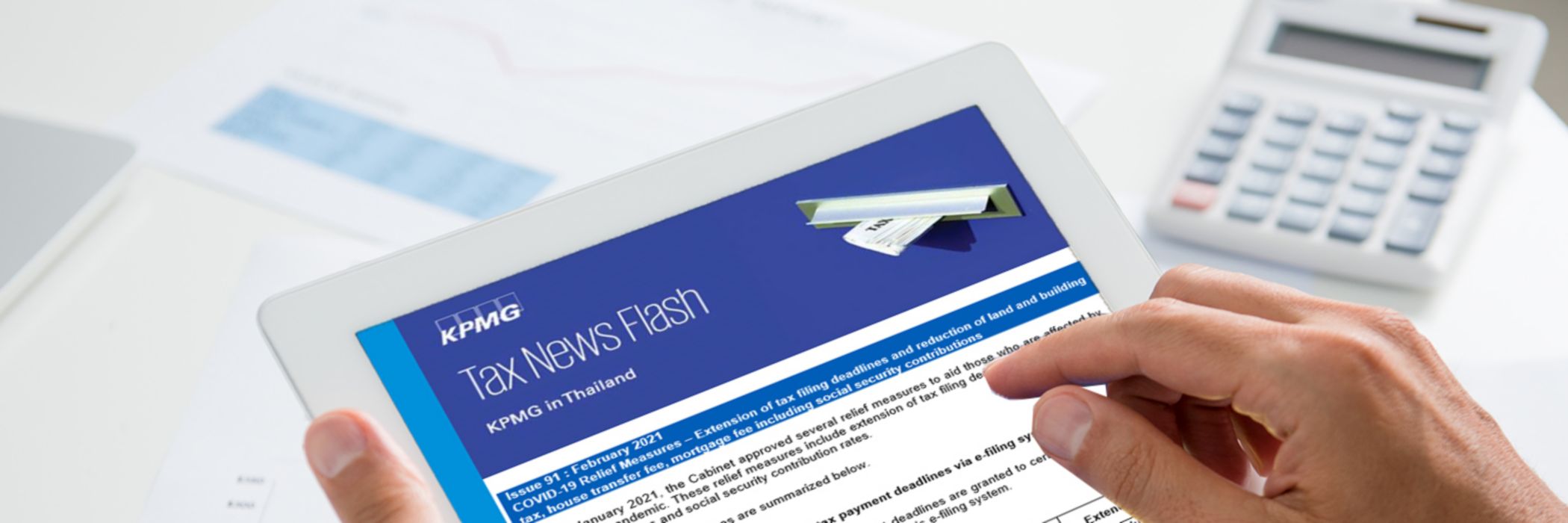Tax Amnesty
Tax & Legal News Flash Issue 55
On 25 March 2019, it was published in the Royal Gazette the Tax Amnesty Law which will enter into force from 26 March 2019.

Why this matter
For taxpayers whose tax affairs are not in order consequent to having misstated their assets, not paid or under-paid their tax liabilities, this new Law should provide an advantageous opportunity to regularize their situation and re-establish their compliance record with the Thai tax authorities.
Requirements for participants
In order for a taxpayer to qualify for participation in the Tax Amnesty, the following requirements must be fulfilled:
- It must be a company or juristic partnership with income from its business for the last accounting period ended on or before 30 September 2018 of not exceeding THB 500 million (for the accounting period of at least 12 months), and
- It must have submitted a PND 50 form with the Thai Revenue Department before the Law came into force, and
- Not having record of having issued or used false tax invoices where the Thai Revenue Department has brought the case before the police under criminal law prior to the Law came into force.
How to participate
For participating in the Tax Amnesty program, the taxpayer has to:
- Register with the Thai Revenue Department by 30 June 2019 in accordance with specific rules, methods and conditions to be prescribed the Director-General;
- File a tax return or request to pay duty by cash and pay the tax that has not been paid or paid incorrectly in full by 30 June 2019 with respect to the following taxes and accounting periods:
a. Corporate Income Tax (“CIT”) for the accounting period(s) started from or after 1 January 2016 to 31 December 2017;
b. Value Added Tax (“VAT”) and Specific Business Tax (“SBT”) for the monthly periods started from January 2016 to the month before the Tax Amnesty Law has entered into force;
c. Stamp Duty (“SD”) for documents, that the Director-General has required duty payment by cash instead of adhesive stamp, executed by a company or juristic partnership from 1 January 2016 to 25 March 2019 (i.e. the day before the day in which the Tax Amnesty Law entered into force).
- File all kinds of tax returns under the Revenue Code for the taxes that the taxpayer has duty to deduct or remit on any transactions occurred from 1 January 2016 to 25 March 2019 (i.e. the day before the day in which the Tax Amnesty Law entered into force) and remit the outstanding or incomplete taxes to the Thai Revenue Department by 30 June 2019.
Benefits of participation
By participating in the Tax Amnesty program, qualified taxpayers should be waived any criminal sanctions under the Revenue Code regarding any of the taxes concerned.
In addition, all qualified taxpayers will be exempt from surcharges and penalties of CIT, VAT, SBT, and SD that would otherwise be applicable for the periods mentioned under 2) and 3) above, provided that:
- a tax assessment or notification for payment has not been issued by the Thai tax authorities prior to the entry in force of the Tax Amnesty Law, and
- the taxpayer who has participated in the Tax Amnesty program files all tax returns due from 1 July 2019 to 30 June 2020 and pays taxes exclusively via internet unless it has a justifiable reason for not doing so (as prescribed by the Thai Revenue Department).
Failure to comply with these conditions will result in the taxpayer not being entitled to the Tax Amnesty and the Thai Revenue Department should have the power to retrospectively require the payment of all surcharges and penalties that the taxpayer wishes to obtain the waiver under the Tax Amnesty program.
KPMG comments
There are still some important matters in respect of the practical application of the Tax Amnesty Law which will need to be addressed in the regulations to be released by the Director-General of the Thai Revenue Department, such as how to claim surcharge and penalty exemption, and what kind of evidence required by the Thai Revenue Department to support such exemption, and how to deal with the filling of all new tax returns by 30 June 2019.
Because of the complexities and implications of the Tax Amnesty Law, we recommend that concerned parties consult with their qualified legal and tax advisors before joining the Tax Amnesty program. Moreover, we note that this is a program that is only applicable for Small Medium Enterprises (“SMEs”) with the income of not exceeding THB 500 million as discussed above.
Connect with us
- Find office locations kpmg.findOfficeLocations
- kpmg.emailUs
- Social media @ KPMG kpmg.socialMedia

